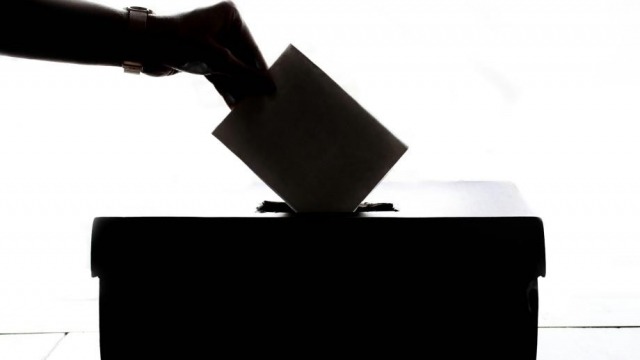Opinion: Australia is not immune from the democracy crisis facing USA

By Mark Kenny
A version of this article was originally published by The Canberra Times.
American talkshow host Bill Maher launched a searing down-the-camera blast seven nights ago in which he noted there were nearly 300 candidates on the ballot for the US mid-terms "who don't believe in ballots".
He was referring to Make-America-Great-Again Republicans who continue to claim the 2020 election was stolen from Donald Trump.
Maher, who has nearly 11 million Twitter followers, didn't mess around, imploring Americans to "vote for the only party still in favour of democratic preservation".
But his plea carried equal measures of alarmism and defeatism, too.
"Anyone who believes this has already voted, anyone who has yet to learn it isn't watching and, besides, nobody in America can be persuaded of anything, anymore," he said.
Fears were understandably high ahead of the mid-term elections of a "red-wave" of Trumpists flushing into Congress on a mission from God to cripple the Biden "woke-ists".
The righteous wave didn't eventuate with some of the craziest MAGAs unsuccessful but the new Republican-controlled 'house' will still cause problems.
More chilling, though, is that many Republican voters have given up on democracy. One GOP candidate actually said out loud if they were to win, Republicans would never lose another vote in their state.
America is now so irrevocably divided, the rules barely work, stoking concerns the centre cannot hold as William Butler Yeats famously foretold in his 1920 poem "The Second Coming".
How prescient that fear and apposite its title given the fervour among Trump's cult-like base that he will get a second term.
Why do so many Republicans seem blasé about surrendering rights which define their country?
Maher's assessment is these MAGA voters were never taught what democracy was "meant to look like" and had "never followed politics anyway" so would hardly mourn the loss of abstractions they'd never comprehended.
This attribution of failure at the school education level is a commonly held one - in this country, too.
It stresses the need to teach kids about government, parliament, legislation and parties, as well as more difficult elements like the federal-state relationship.
Prima facie, these arguments are sound enough but do they go far enough?
Or rather, do they go to the origin of the problem, because yes democracy, freedom, equality before the courts, are established in law, but their full value is not exclusively a matter of the head but also of the heart.
The irony in the US is it is the most furious of flag-wavers who rail the loudest against their country. They declare themselves patriots yet seem to have fallen out of love with America's signature achievement - that of being a secular, constitutional, rule-of-law super-power through centuries in which rivals have come and gone succumbing to totalising ideologies of communism, fascism and theocracy.
Communism remains unpopular, but white Pentecostal MAGA Republicans are now rushing towards the other two. That's where explicitly calling for an avowedly Christian America in which elections are deniable, leads.
These voters have come to hold other signifiers of their American-ness closer to their hearts. They view government as dangerous, secularism as "woke", and hold the right to bear arms, ostensibly to defend oneself against their own government, as sacred.
In mainstream Australia, this starting point of antipathy and suspicion simply doesn't exist.
Speaking with an American scholar of Australian studies last week, this point was reinforced.
Dr Rhonda Evans, an expert in human rights law, told me the Australian sense of government was essentially "utilitarian" in nature and largely transactional. Australians tend to think of it in terms of what it can, or must, do for them.
Americans, by contrast, start from the opposite position - one of hostility, inasmuch as government's existence inevitably inhibits the individual.
Yet the danger for Australia even, is that after three-plus decades of neoliberalism emphasising market supremacy, small government is in danger of going from benignly unremarked to actively unloved.
While we might have started at different points, Australia and America could be on similar paths.
At the heart of America's crisis of faith, and it infects the UK and Australia also, is vaulting inequality.
In the US, wage earners have been going backwards relative to purchasing power for most of the last 50 years.
Australia has done less poorly on income distribution, thanks to better social security systems, universal health insurance, more accessible education and training places, and labour unions - at least in the earlier decades. But insanely generous and distortionary tax breaks on property and shares, and privatisation of key utilities have left many behind.
If these citizens withdraw support from government itself, many will do so after concluding they were abandoned first. That is, that government had gone from problem-solving to problem-making.
An ideological urge to ever-lower taxes has forced the budget into structural deficit and yet the answer, it seems, can never be, adequate revenue.
Australia's gas-price crisis is a clear sign of the pervasiveness of this market logic.
Bipartisan policy thorough recent decades, means the world's greatest supplier of LNG under-supplies its own population. That is an epic failure of policy and a betrayal of the national interest.
Tellingly, the companies gouging this natural resource, are making unconscionable war profits out of the disastrous situation in Europe, yet the government still feels there is insufficient moral justification for wholesale reform.
Governments have made themselves toothless, surrendering the field to market rationales that are good when things are good and disastrous when they are not.
That way lays danger.
Mark Kenny is a professor at the ANU Australian Studies Institute and host of the Democracy Sausage podcast.








